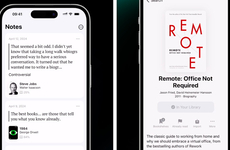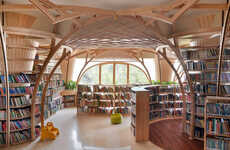
Florida Polytechnic University Has a Massive New Bookless Library
Rahul Kalvapalle — August 29, 2014 — Lifestyle
References: floridapolytechnic.org & theguardian
Florida Polytechnic University is opening an enormous bookless library that will make all its 'books' available to students in digital form. The students will have access to around 135,000 e-books in a bright open space that features computers rather than bookshelves.
The bookless library has set aside a budget of $60,000 for students to be able to read e-books that the library doesn't already own. Once a book has been read twice on the system, it will be automatically purchased. This allows students to "make direct choices regarding the books they want to read and to have available in the library", and makes it possible for the university to only pay for those books that will actually be used.
The library space itself is 11,000 square feet and sits in a massive, white-domed building designed by noted Spanish architect Santiago Calatrava.
The bookless library has set aside a budget of $60,000 for students to be able to read e-books that the library doesn't already own. Once a book has been read twice on the system, it will be automatically purchased. This allows students to "make direct choices regarding the books they want to read and to have available in the library", and makes it possible for the university to only pay for those books that will actually be used.
The library space itself is 11,000 square feet and sits in a massive, white-domed building designed by noted Spanish architect Santiago Calatrava.
Trend Themes
1. Bookless Libraries - The move from physical to digital libraries is disrupting the publishing & library industries.
2. E-book Purchasing - E-book purchases that are demand-driven enables educational institutions to reduce book costs.
3. Digital Library Spaces - Digital libraries offer universities and institutions opportunities to design new library spaces.
Industry Implications
1. Publishing - Publishers must reconsider their strategies around sales, marketing, and distribution with libraries going bookless.
2. Library Services - Libraries must adopt emerging technologies to remain relevant in the digital era.
3. Architecture - Architects have new design opportunities to develop structures that can house digital book collections.
3
Score
Popularity
Activity
Freshness























